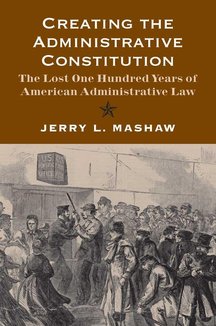Recommended Books

Creating the Administrative Constitution: The Lost One Hundred Years of American Administrative Law (Yale Law Library Series in Legal History and Reference)
Author:
Jerry L. Mashaw
ISBN 13:
978-0300180022
This groundbreaking book is the first to look at administration and administrative law in the earliest days of the American republic. Jerry Mashaw demonstrates that from the very beginning Congress delegated vast discretion to administrative officials and armed them with extrajudicial adjudicatory, rulemaking, and enforcement authority. The legislative and administrative practices of the U.S. Constitution’s first century created an administrative constitution hardly hinted at in its formal text. This book, in the author’s words, will "demonstrate that there has been no precipitous fall from a historical position of separation-of-powers grace to a position of compromise; there is not a new administrative constitution whose legitimacy should be understood as not only contestable but deeply problematic."

The Forging of Bureaucratic Autonomy: Reputations, Networks, and Policy Innovation in Executive Agencies, 1862-1928.
Author:
Daniel Carpenter
ISBN 13:
978-0691070100
Until now political scientists have devoted little attention to the origins of American bureaucracy and the relationship between bureaucratic and interest group politics. In this pioneering book, Daniel Carpenter contributes to our understanding of institutions by presenting a unified study of bureaucratic autonomy in democratic regimes. He focuses on the emergence of bureaucratic policy innovation in the United States during the Progressive Era, asking why the Post Office Department and the Department of Agriculture became politically independent authors of new policy and why the Interior Department did not. To explain these developments, Carpenter offers a new theory of bureaucratic autonomy grounded in organization theory, rational choice models, and network concepts. According to the author, bureaucracies with unique goals achieve autonomy when their middle-level officials establish reputations among diverse coalitions for effectively providing unique services. These coalitions enable agencies to resist political control and make it costly for politicians to ignore the agencies' ideas. Carpenter assesses his argument through a highly innovative combination of historical narratives, statistical analyses, counterfactuals, and carefully structured policy comparisons. Along the way, he reinterprets the rise of national food and drug regulation, Comstockery and the Progressive anti-vice movement, the emergence of American conservation policy, the ascent of the farm lobby, the creation of postal savings banks and free rural mail delivery, and even the congressional Cannon Revolt of 1910.